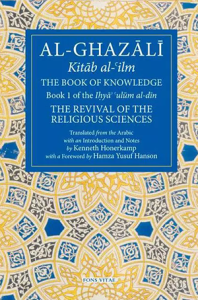Al-Ghazali The Book of Knowledge (Ihya Ulumuddin Series No. 1)

Author: Imām Al-Ghazali
Translator: Kenneth Honerkamp
Publisher: Fons Vitae Publishing
Year of Publication: 2016
Print Length: 336 pages
Genre: Islamic Studies / Quranic Studies; Theology, Ethics and Philosophy; Islamic Law and Jurisprudence, Science; Qur’anic Reflection, Supplication & Prayers; Non-Fiction / Religious Studies
Topic: Islam, Qur’an, Scholarship & Knowledge, Religious Authority, Religious Institution
The Book of Knowledge (Kitab al-ilm) is the foundation of the forty books of the Revival of the Religious Sciences (Ihya ulum al-din), Imam al-Ghazali’s magnum opus. In the Book of Knowledge, he defines knowledge, its relation to faith, theology, and jurisprudence.
The book deals with the virtue of knowledge from both rational and traditional points of view. It elucidates the types of knowledge and the nature of people’s obligation to seek knowledge. Imam al-Ghazali defines jurisprudence and theology as branches of Islamic knowledge, then outlines those fields that people incorrectly consider to be Islamic disciplines, and distinguishes the praiseworthy from the blameworthy. He describes in detail the perils of disputation and the reasons people engage in debate and dialectics. He also considers the conduct incumbent on the teacher and student, and warns of the perils that can befall those pursuing knowledge. Finally, Imam al-Ghazali discusses the virtues and categories of the intellect and the prophetic traditions related to it.
Table of Contents
Foreword by Hamza Yusuf Hanson
Publisher’s Note
Translator’s Preface
Acknowledgments
Author’s Introduction: Outline / Previous Works on the Subject / Arrangement of this Book / Outward and Inward Knowledge
THE BOOK OF KNOWLEDGE
Chapter 1
The Virtue of Knowledge
Textual Evidence from the Qur’ān / The Prophetic Reports / The Traditions of the Companions and Others
The Virtue of Learning
Verses from the Qur’ān / The Prophetic Reports / The Traditions of the Companions and Others
The Virtues of Teaching
Verses from the Qur’ān / The Prophetic Reports / The Traditions of the Companions and Others
Rational Proofs
Elucidation
Chapter 2
An Elucidation of Knowledge that is Compulsory for each Individual
An Elucidation of the Knowledge that is a Communal Obligation
Imāms of Jurisprudence
Imām al-Shāfi’i (ra.) / Imām Mālik (ra.) / Imām Abū Hanīfa (ra.) / Imām Ahmad Ibn Ḥanbal and Sufyān (ra.)
Chapter 3
An Elucidation on the Reason Some Knowledge is Blameworthy
An Elucidation of the Names of the Disciplines that have been Altered
The First Term: Jurisprudence
The Second Term: Knowledge (‘ilm)
The Third Term: Unity (tawḥid)
The Fourth Term: Remembrance and Admonition
The Fifth Term: Wisdom (ḥikma)
An Elucidation of the Praiseworthy Elements in the Praiseworthy Disciplines
Chapter 4
Knowledge of Variant Opinions and the Perils of Disputation
An Elucidation of the Duplicity Involved in Comparing these Disputations with the Deliberations of the Companions and the Mutual Consultations of the Predecessors
An Elucidation of the Perils of Disputation and the Destruction of Morals that Results from it
Chapter 5
On the Comportment Incumbent upon the Student and the Teacher
An Elucidation of the Functions of the Guide and the Teacher
Chapter 6
The Perils of the Pursuit of Knowledge
An Elucidation of the Traits of the Scholars of the Hereafter and of the Reprehensible Scholars
The Traditions from the Companions
The Traits of the Scholars of the Hereafter
Ḥātim al-Aṣamm
Letter to Imām Mālik b. Anas (ra.)
Imām ‘Ali (ra.) on Scholars of the Hereafter
Scholars of the Hereafter and Certitude
Increase and Decrease of Certitude
Most Worthy Acts
Worldly Scholars
Remembrance and Admonition
Invented Matters
Chapter 7
On the Intellect and Its Noble Nature: Its Real Nature and Categories
An Elucidation of the Noble Nature of the Intellect
An Elucidation of the Real Nature of the Intellect and its Categories
An Elucidation on People’s Disparities in the Intellect
Bibliography: Works in Western Language / Works in Arabic
Indexes: Qur’ānic Verses Cited / Index

Imām Abu Hamid al-Ghazali is a 11th century Muslim scholar. He was one of the most prominent and influential philosophers, theologians, jurists, and mystics of Sunni Islam. Al-Ghazālī was born at Ṭūs (near Mashhad in eastern Iran) and was educated there, then in Jorjān, and finally at Nishapur (Neyshābūr), where his teacher was al-Juwaynī, who earned the title of imām al-ḥaramayn (the imam of the two sacred cities of Mecca and Medina). He was active at a time when Sunni theology had just passed through its consolidation and entered a period of intense challenges from Shiite Ismâ’îlite theology and the Arabic tradition of Aristotelian philosophy (falsafa). Al-Ghazâlî understood the importance of falsafa and developed a complex response that rejected and condemned some of its teachings, while it also allowed him to accept and apply others. His great work, Iḥyāʾ ʿulūm al-dīn or Ihya Ulumuddin (“The Revival of the Religious Sciences”), made Sufism (Islamic mysticism) an acceptable part of orthodox Islam.
Source: https://plato.stanford.edu/entries/al-ghazali/
More from Imam al-Ghazali in this library, click here.

Kenneth Honerkamp is a graduate of the al-Qarawiyyin University of Morocco; the University of Aix-en-Provence, France; and the University of Georgia. He has worked extensively in the manuscript libraries of Morocco. His research interests lie in the fields of teacher/disciple relationships in formative Sufism, the shared spiritual heritage of Islamic Spain and Morocco and the study and translation of letters of spiritual guidance written by Moroccan Sufi teachers. He has edited and translated numerous previously unpublished works of Abu Abd al-Rahman al-Sulami (d. 412/1021). His critical edition of the Rasa’il al-kubra of Ibn Abbad of Ronda (d. 792/1390) was published by Dar al-Machreq, Lebanon in 2005. Since then he has edited two works of Ibn Abbad: Bughiyat al-murīd (a versification of the Ḥikm of Ibn ʿAṭāʾ Allāh) and Khuṭab al-muwāsim (a collection of sermons from 14th cen. Fes). His recent translation is the Book of Knowledge, Book One of Iḥyāʾ ʿulūm ad-dīn by Abū Ḥāmid al-Ghazālī (1058-1111) has met with wide spread approval since its publication in 2015. He presently holds the position of Full Professor in the Department of Religion at the University of Georgia at Athens.
Source: https://religion.uga.edu/directory/people/kenneth-honerkamp
More from Kenneth Honerkamp in this library, click here.
